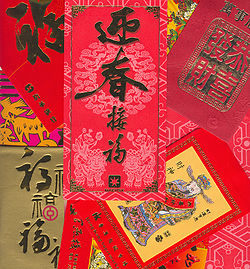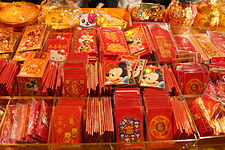- Red envelope
-
For the film production/distribution company, see Red Envelope Entertainment. For the cabaret, see Red Envelope Club.
Red envelope 
Assorted examples of contemporary red envelopes Chinese name Traditional Chinese 紅包 Simplified Chinese 红包 Literal meaning red package Transcriptions Hakka - Romanization Fung Bao Mandarin - Hanyu Pinyin hóngbāo Min - Hokkien POJ âng-pau Cantonese (Yue) - Jyutping hung4 baau1 - Yale Romanization hùhng bāauh Alternative Chinese name Chinese 利是 or 利事 Literal meaning good for business Transcriptions Hakka - Romanization li si Mandarin - Hanyu Pinyin lìshì Cantonese (Yue) - Jyutping lai6 si6 - Yale Romanization làih sih Vietnamese name Vietnamese lì xì
phong bao mừng tuổiIn Chinese and other Asian societies, a red envelope or red packet (known as hóngbāo in Mandarin, Ang Pao in Min Nan, Lai See in Cantonese, Sae Bae Don (세뱃돈/歲拜돈) in Korean, and Lì Xì in Vietnamese) is a monetary gift which is given during holidays or special occasions.
Contents
Usage
Red envelopes are mainly presented at social and family gatherings such as weddings or on holidays such as the Lunar New Year. The red color of the envelope symbolizes good luck and is supposed to ward off evil spirits. The act of requesting for red packets is normally called (Mandarin): 討紅包, 要利是, (Cantonese):逗利是. A married person would not turn down such request as it would mean that he or she would be "out of luck" in the new year. In keeping with Chinese customs, newly wedded couples are also usually expected to be extremely generous with the amount offered in the red packets, so as to receive blessings for a blissful marriage.
The amount of money contained in the envelope usually ends with an even digit, in accordance with Chinese beliefs; for instance 88 and 168 are both lucky numbers, as odd-numbered money gifts are traditionally associated with funerals. But there is a widespread tradition that money should not be given in fours, or the number four should not appear in the amount, such as 40, 400 and 444 as the pronunciation of the word "four" resembles that of the word "death", and it signifies bad luck for many Chinese (See Numbers in Chinese culture). At weddings, the amount offered is usually intended to cover the cost of the attendees as well as a goodwill to the newlyweds. It is considered extremely rude to give a low amount of money on such an occasion.
During the Lunar New Year, mainly in South China, red envelopes (in the North, just money without any cover) are typically given by the married to the unmarried, most of whom are children. The amount of money is usually a single note to avoid heavy coins, and to make it difficult to judge the amount inside before opening. It is traditional to put brand new notes inside red envelopes, as well as to avoid opening the envelopes in front of the relatives out of courtesy. In recent years, some Asian-based banks provide newer-looking notes to reduce the environmental impact of printing new banknotes.
In Vietnam, lì xì are typically given to those who are children (typically 5 years of age and younger).
Red envelopes are also used to deliver payment for favorable service to lion dance performers, religious practitioners, teachers and doctors.
Origin
There are no clear literary sources from which to trace the origin of the red envelope tradition. In China, during the Qin Dynasty, the elderly would thread coins with a red string. The money was called yāsuì qián (Chinese: 壓歲錢 Chinese: 压岁钱), meaning "money warding off evil spirits", and was believed to protect the elderly from sickness and death.[citation needed] The yāsuì qián was replaced by red envelopes when printing presses became more common. Red envelopes are also referred to as yāsuì qián.
Other customs
Other similar traditions also exist in other countries in Asia. In Vietnam, red envelopes are called lì xì (similar to the Cantonese pronunciation "li see") or, in some cases, phong bao mừng tuổi (happy new age envelope). In Thailand, they are known as ang pow (the pronunciation of the Chinese characters for "red envelope" in the Teochew dialect) or tae ea among the Chinese-Thai. In Myanmar (Burma), the Burmese Chinese refer to them as an-pao (Burmese: ), and South Korea's envelopes, which are white, not red, are called "sae bae don".
In Japan, a monetary gift called otoshidama is given to children by their relatives during the New Year period. However, white envelopes are used instead, with the name of the receiver written on its obverse. A similar practice is observed for Japanese weddings, but the envelope is folded rather than sealed, and decorated with an elaborate bow.
In the Philippines, Chinese Filipinos exchange ang pao (from the Hokkien pronunciation, as most Chinese in the Philippines are of Hokkien descent) during the Chinese New Year. For non-Chinese Filipinos, ang pao is an easily recognizable symbol of the Lunar New Year holiday and in some places, the envelopes are also appropriated by non-Chinese in giving monetary gifts on other occasions such as Christmas and birthdays.
Green envelope
The Malay Muslims in Malaysia, Brunei, Singapore, Indonesia have adapted the Chinese custom of handing out money gifts as part of their Eid al-Fitr[citation needed] ("Hari Raya Aidilfitri" in the Malay language) celebrations, by issuing token gifts of money in green packets. Customarily, during Eid a family will have (usually small) amounts of money in green envelopes ready to give to visitors, and may send them to friends and family unable to visit. Green is used for its traditional association with Islam, and the adaptation of the red envelope is based on the Muslim custom of sadaqah, or voluntary charity. While present in the Quran, sadaqah is much less formally established than the sometimes similar practice of zakat, and in many cultures takes a form similar to the green envelope closer to gift-giving and generosity among friends than charity in the strict sense: no attempt is made to give more to guests 'in need', nor is it (as Islamic charity is conventionally seen as) a religious obligation.
See also
Notes
External links
Chinese New Year Topics Chinese dragon · Chinese New Year · CCSTV New Year's Gala · CCTV New Year's Gala · Chinese New Year in Singapore · Chunyun · Lion dance · New Year picture · Red envelope · Reunion dinner · San Francisco Chinese New Year Festival and Parade · Color in Chinese culture · Fireworks · Firecracker · Dragon dance · NianFood Bakkwa · Buddha's delight · Fa gao · Fat choy · Jau gok · Jiaozi · Kralan · Kuih · Lotus seed · Nian gao · Reunion dinner · Spring pancake · Squab (food) · Taro cake · Turnip cake · Yusheng · Melon seed · Mandarin orange · Fish · PineappleCategories:- Traditional Chinese objects
- Chinese New Year
- Luck
- Giving
Wikimedia Foundation. 2010.

